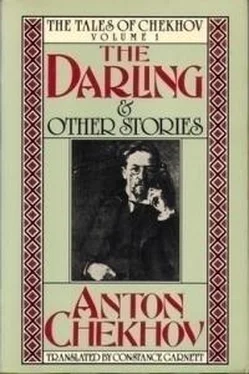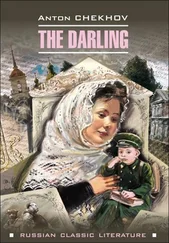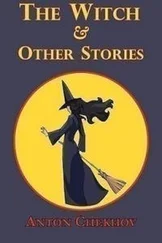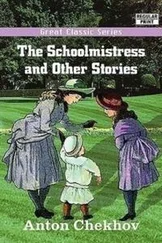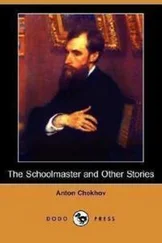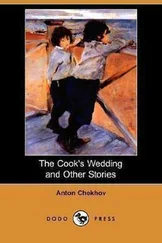Антон Чехов - The Darling
Здесь есть возможность читать онлайн «Антон Чехов - The Darling» — ознакомительный отрывок электронной книги совершенно бесплатно, а после прочтения отрывка купить полную версию. В некоторых случаях можно слушать аудио, скачать через торрент в формате fb2 и присутствует краткое содержание. Год выпуска: 2014, Издательство: epubBooks Classics, Жанр: Классическая проза, на английском языке. Описание произведения, (предисловие) а так же отзывы посетителей доступны на портале библиотеки ЛибКат.
- Название:The Darling
- Автор:
- Издательство:epubBooks Classics
- Жанр:
- Год:2014
- ISBN:нет данных
- Рейтинг книги:5 / 5. Голосов: 1
-
Избранное:Добавить в избранное
- Отзывы:
-
Ваша оценка:
- 100
- 1
- 2
- 3
- 4
- 5
The Darling: краткое содержание, описание и аннотация
Предлагаем к чтению аннотацию, описание, краткое содержание или предисловие (зависит от того, что написал сам автор книги «The Darling»). Если вы не нашли необходимую информацию о книге — напишите в комментариях, мы постараемся отыскать её.
The Darling — читать онлайн ознакомительный отрывок
Ниже представлен текст книги, разбитый по страницам. Система сохранения места последней прочитанной страницы, позволяет с удобством читать онлайн бесплатно книгу «The Darling», без необходимости каждый раз заново искать на чём Вы остановились. Поставьте закладку, и сможете в любой момент перейти на страницу, на которой закончили чтение.
Интервал:
Закладка:
When at midday, on the day after his arrival at Moscow, Laptev went into the warehouse, the workmen packing the goods were hammering so loudly that in the outer room and the office no one heard him come in. A postman he knew was coming down the stairs with a bundle of letters in his hand; he was wincing at the noise, and he did not notice Laptev either. The first person to meet him upstairs was his brother Fyodor Fyodorovitch, who was so like him that they passed for twins. This resemblance always reminded Laptev of his own personal appearance, and now, seeing before him a short, red–faced man with rather thin hair, with narrow plebeian hips, looking so uninteresting and so unintellectual, he asked himself: "Can I really look like that?"
"How glad I am to see you!" said Fyodor, kissing his brother and pressing his hand warmly. "I have been impatiently looking forward to seeing you every day, my dear fellow. When you wrote that you were getting married, I was tormented with curiosity, and I've missed you, too, brother. Only fancy, it's six months since we saw each other. Well? How goes it? Nina's very bad? Awfully bad?"
"Awfully bad."
"It's in God's hands," sighed Fyodor. "Well, what of your wife? She's a beauty, no doubt? I love her already. Of course, she is my little sister now. We'll make much of her between us."
Laptev saw the broad, bent back—so familiar to him—of his father, Fyodor Stepanovitch. The old man was sitting on a stool near the counter, talking to a customer.
"Father, God has sent us joy!" cried Fyodor. "Brother has come!"
Fyodor Stepanovitch was a tall man of exceptionally powerful build, so that, in spite of his wrinkles and eighty years, he still looked a hale and vigorous man. He spoke in a deep, rich, sonorous voice, that resounded from his broad chest as from a barrel. He wore no beard, but a short–clipped military moustache, and smoked cigars. As he was always too hot, he used all the year round to wear a canvas coat at home and at the warehouse. He had lately had an operation for cataract. His sight was bad, and he did nothing in the business but talk to the customers and have tea and jam with them.
Laptev bent down and kissed his head and then his lips.
"It's a good long time since we saw you, honoured sir," said the old man—"a good long time. Well, am I to congratulate you on entering the state of holy matrimony? Very well, then; I congratulate you."
And he put his lips out to be kissed. Laptev bent down and kissed him.
"Well, have you brought your young lady?" the old man asked, and without waiting for an answer, he said, addressing the customer: "'Herewith I beg to inform you, father, that I'm going to marry such and such a young lady.' Yes. But as for asking for his father's counsel or blessing, that's not in the rules nowadays. Now they go their own way. When I married I was over forty, but I went on my knees to my father and asked his advice. Nowadays we've none of that."
The old man was delighted to see his son, but thought it unseemly to show his affection or make any display of his joy. His voice and his manner of saying "your young lady" brought back to Laptev the depression he had always felt in the warehouse. Here every trifling detail reminded him of the past, when he used to be flogged and put on Lenten fare; he knew that even now boys were thrashed and punched in the face till their noses bled, and that when those boys grew up they would beat others. And before he had been five minutes in the warehouse, he always felt as though he were being scolded or punched in the face.
Fyodor slapped the customer on the shoulder and said to his brother:
"Here, Alyosha, I must introduce our Tambov benefactor, Grigory Timofeitch. He might serve as an example for the young men of the day; he's passed his fiftieth birthday, and he has tiny children."
The clerks laughed, and the customer, a lean old man with a pale face, laughed too.
"Nature above the normal capacity," observed the head–clerk, who was standing at the counter close by. "It always comes out when it's there."
The head–clerk—a tall man of fifty, in spectacles, with a dark beard, and a pencil behind his ear—usually expressed his ideas vaguely in roundabout hints, while his sly smile betrayed that he attached particular significance to his words. He liked to obscure his utterances with bookish words, which he understood in his own way, and many such words he used in a wrong sense. For instance, the word "except." When he had expressed some opinion positively and did not want to be contradicted, he would stretch out his hand and pronounce:
"Except!"
And what was most astonishing, the customers and the other clerks understood him perfectly. His name was Ivan Vassilitch Potchatkin, and he came from Kashira. Now, congratulating Laptev, he expressed himself as follows:
"It's the reward of valour, for the female heart is a strong opponent."
Another important person in the warehouse was a clerk called Makeitchev—a stout, solid, fair man with whiskers and a perfectly bald head. He went up to Laptev and congratulated him respectfully in a low voice:
"I have the honour, sir…The Lord has heard your parent's prayer. Thank God."
Then the other clerks began coming up to congratulate him on his marriage. They were all fashionably dressed, and looked like perfectly well–bred, educated men. Since between every two words they put in a "sir," their congratulations—something like "Best wishes, sir, for happiness, sir," uttered very rapidly in a low voice—sounded rather like the hiss of a whip in the air—"Shshsh–s s s s s!" Laptev was soon bored and longing to go home, but it was awkward to go away. He was obliged to stay at least two hours at the warehouse to keep up appearances. He walked away from the counter and began asking Makeitchev whether things had gone well while he was away, and whether anything new had turned up, and the clerk answered him respectfully, avoiding his eyes. A boy with a cropped head, wearing a grey blouse, handed Laptev a glass of tea without a saucer; not long afterwards another boy, passing by, stumbled over a box, and almost fell down, and Makeitchev's face looked suddenly spiteful and ferocious like a wild beast's, and he shouted at him:
"Keep on your feet!"
The clerks were pleased that their young master was married and had come back at last; they looked at him with curiosity and friendly feeling, and each one thought it his duty to say something agreeable when he passed him. But Laptev was convinced that it was not genuine, and that they were only flattering him because they were afraid of him. He never could forget how fifteen years before, a clerk, who was mentally deranged, had run out into the street with nothing on but his shirt and shaking his fists at the windows, shouted that he had been ill–treated; and how, when the poor fellow had recovered, the clerks had jeered at him for long afterwards, reminding him how he had called his employers "planters" instead of "exploiters." Altogether the employees at Laptevs' had a very poor time of it, and this fact was a subject of conversation for the whole market. The worst of it was that the old man, Fyodor Stepanovitch, maintained something of an Asiatic despotism in his attitude to them. Thus, no one knew what wages were paid to the old man's favourites, Potchatkin and Makeitchev. They received no more than three thousand a year, together with bonuses, but he made out that he paid then seven. The bonuses were given to all the clerks every year, but privately, so that the man who got little was bound from vanity to say he had got more. Not one boy knew when he would be promoted to be a clerk; not one of the men knew whether his employer was satisfied with him or not. Nothing was directly forbidden, and so the clerks never knew what was allowed, and what was not. They were not forbidden to marry, but they did not marry for fear of displeasing their employer and losing their place. They were allowed to have friends and pay visits, but the gates were shut at nine o'clock, and every morning the old man scanned them all suspiciously, and tried to detect any smell of vodka about them:
Читать дальшеИнтервал:
Закладка:
Похожие книги на «The Darling»
Представляем Вашему вниманию похожие книги на «The Darling» списком для выбора. Мы отобрали схожую по названию и смыслу литературу в надежде предоставить читателям больше вариантов отыскать новые, интересные, ещё непрочитанные произведения.
Обсуждение, отзывы о книге «The Darling» и просто собственные мнения читателей. Оставьте ваши комментарии, напишите, что Вы думаете о произведении, его смысле или главных героях. Укажите что конкретно понравилось, а что нет, и почему Вы так считаете.
